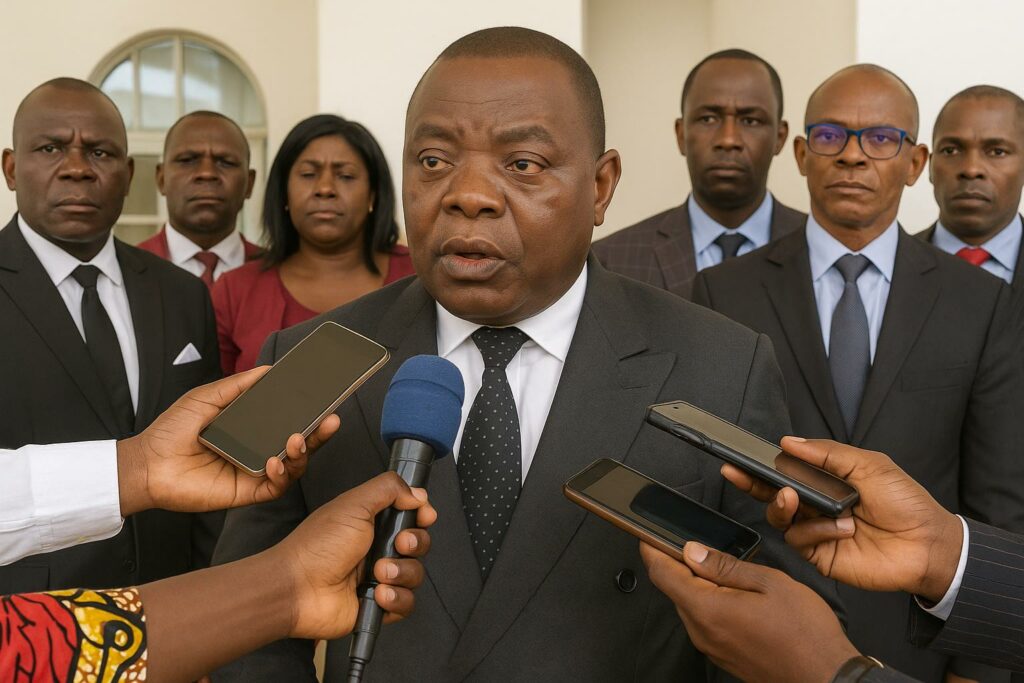Mediated truce in the education sector
The unexpected announcement issued on 17 October by Herbin Bakétiba, spokesperson for the National Education Union Platform (PSEN), reverberated across faculty rooms from Pointe-Noire to Ouesso. Barely a week after union leaders had renewed a strike notice, they decided to “concede the suspension” of the action, trusting the personal involvement of the Mediator of the Republic, Valère Gabriel Eteka Yemet, to transmit their grievances to the executive.
Two rounds of talks held on 14 and 17 October at the Mediator’s offices provided, according to participants, a “frank and fruitful” atmosphere conducive to compromise. Union sources say that Mr Eteka Yemet committed himself to present the file directly to the line ministers for Primary, Secondary and Technical Education, to the Minister of Finance, to the Minister of State in charge of the Civil Service, and ultimately to the Prime Minister and the Presidency. The moratorium, though not open-ended, acts as a confidence-building measure while the administrative channels are mobilised.
Teachers’ demands gaining traction
At the heart of the PSEN’s seventeen-page cahier de charges lies a call for an expansion of teacher recruitment quotas. Thousands of qualified instructors remain on waiting lists despite a demographic upsurge in classroom populations. Equally critical are the publication of civil-service engagement texts, the regularisation of instructors aged over forty-five, and overdue promotions for cohorts hired over the past decade.
Union representatives argue that these measures are indispensable for stabilising pedagogical teams and reducing the resort to temporary staff, a recurring weakness flagged in annual reports by the Ministry of Planning. In their communiqué, they invoked the “higher interests of the nation and of our children”, framing their cause as a prerequisite for educational quality rather than a corporatist crusade.
Government’s room for manoeuvre
Officially, the ministries concerned have welcomed the cooling-off period. A senior official at the Ministry of Finance, speaking on background, acknowledged that fiscal space is tight but insisted that “teacher employment remains a protected budget line”. The 2025 supplementary budget earmarks 12 billion CFA francs for new hires and career adjustments, subject, however, to cash availability.
Political analysts note that the truce coincides with preparations for the 2026 presidential election. Ensuring social peace in classrooms is widely viewed as a strategic imperative for the authorities. President Denis Sassou Nguesso’s government, keen to project stability, has multiplied consultative frameworks with unions since 2023, relying on the Mediator’s office to defuse sectoral tensions without resorting to coercive measures.
À retenir : a narrow window for reforms
The suspension of industrial action is conditional rather than definitive. PSEN has publicly set a horizon of “a fortnight” for visible progress, after which grassroots consultations will decide on future steps. The Mediator, a constitutionally independent figure, enjoys moral authority but no binding power over budgetary allocations. Success will therefore depend on the speed at which technical dossiers—such as lists of non-appointed teachers—pass through the inter-ministerial circuit.
Le point juridique/éco : compliance with public-service law
Under Law 021-2012 on the General Statute of the Civil Service, appointments must be published in the Official Gazette within sixty days of recruitment competitions. The backlog singled out by PSEN exposes the state to potential litigation before administrative courts. From a macro-fiscal standpoint, the recruitment of an additional 3 000 teachers, the figure advanced by union economists, would add roughly 7 billion CFA francs annually to the wage bill—about 0.3 % of GDP—an envelope deemed manageable by several treasury analysts, provided that oil revenue projections hold.
International partners such as the African Development Bank have repeatedly underlined the link between educational spending efficiency and long-term growth. In that context, observers argue that resolving the impasse could signal to donors a renewed commitment to human-capital investment.
A fragile calm before 2026 polls
For now, lecture halls remain open and pupils’ routines undisturbed, an outcome hailed by many parents’ associations who feared a prolonged shutdown similar to the 2021 episode. Yet the underlying tensions have merely been postponed. Should administrative inertia persist, union leaders warn that mobilisation could resume “at any moment”.
Conversely, a successful outcome would not only address teachers’ material aspirations but also bolster the institutional credibility of the Mediator’s office, an organ created in 2003 precisely to anticipate such social frictions. As Congo-Brazzaville navigates the delicate pre-electoral landscape, the education sector thus emerges as both a test case and a barometer of the broader social consensus the nation seeks to consolidate.

